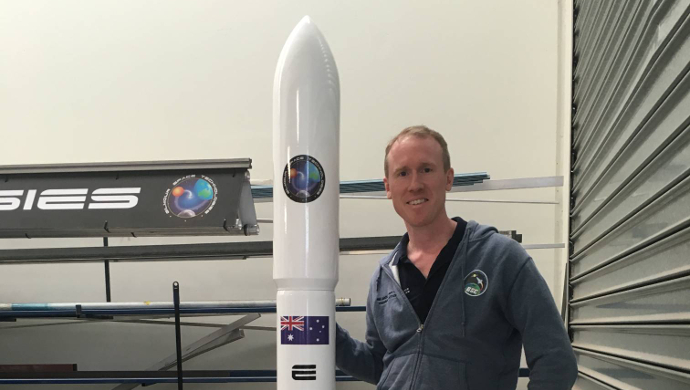The startup plans to launch Eris-100, a three-stage commercial vehicle capable of carrying 100 kilograms to low-earth orbits, in 2020

Adam Gilmour with the Eris Rocket
Gilmour Space Technologies, a Singapore- and Australia-based startup which develops low-cost launch vehicles for the small satellite/payload market, has raised SG$19 million (US$14M) in Series B round of funding, led by Main Sequence Ventures, which manages Australia’s Commonwealth Scientific and Industrial Research Organization (CSIRO) innovation fund.
Existing investors Blackbird Ventures, which led Gilmour’s A$5 million (US$3.6M) Series A round in May last year, and 500 Startups, which increased its stake from the Series A round, besides several unnamed new VCs, family-office and private investors also joined the round.
The company will use the money to scale up and launch its first commercial hybrid rocket to space in 2020. It plans to launch Eris-100, a three-stage commercial vehicle capable of carrying 100 kilograms to low-earth orbits (LEO), in 2020; followed by Eris-400 in 2021, a clustered-engine vehicle for payloads of up to 400 kilograms.
“The small satellite revolution is gaining momentum globally, with thousands of small sats slated to launch into LEO over the next five years. These new players, however, will be challenged by high launch costs and limited launch opportunities,” said Adam Gilmour, CEO and Founder. “To address the bottleneck, Gilmour Space is developing a new breed of hybrid rockets that will offer dedicated LEO launches to small satellite customers at very competitive prices.
“I believe our progress puts us at a Technology Readiness Level (TRL) of six, well ahead of most small launch competitors globally,” he added.
Founded in 2014, Gilmour Space successfully launched the countries’ first privately developed hybrid rocket to an altitude of 5 Km using 3D printed fuel in 2016. Since January 2018, Gilmour Space has completed a series of ground tests on its proprietary orbital-class hybrid rocket engine, generating a record 80 kilonewtons (18,000 pounds) of thrust; signed a Space Act Agreement with NASA (the first private company to do so in Australia); attracted two high-profile space veterans to its advisory board; and is preparing for a suborbital test flight in a few months’ time.
“With our new rockets, we plan to build a commercial ‘road’ to space that will put Gilmour Space Technologies on the global space map,” noted Gilmour.
How the space transportation industry is evolving
For decades, the global rocket industry has been monopolised by large conglomerates such as Boeing. But the lack of competition and bloated bureaucratic structure has led to a stagnation of rocket innovation, prolonged launch schedules, and high costs. Companies who needed cheaper alternatives often sought Russian rocket companies.
But in recent years, serial entrepreneur Elon Musk has caused an upheaval in the space transportation industry through his company SpaceX. The firm has not only managed to make rockets cheaper to manufacture (even though they are made in-house in the US) and launch, but it has also enabled them to return to earth and be reused — a first for any rocket company. Musk’s end goal is to use SpaceX’s rockets to transport humans to Mars to build a colony.
Musk is not the only Silicon Valley entrepreneur with science fiction-fuelled ambitions. Amazon’s Jeff Bezos has also jumped into the resurgent private space race with his spaceflight company Blue Origin. Bezos has stated that he wants to make space tourism more affordable and comfortable.
The post Gilmour Space secures US$14M to develop low-cost hybrid rockets for small satellite market appeared first on e27.